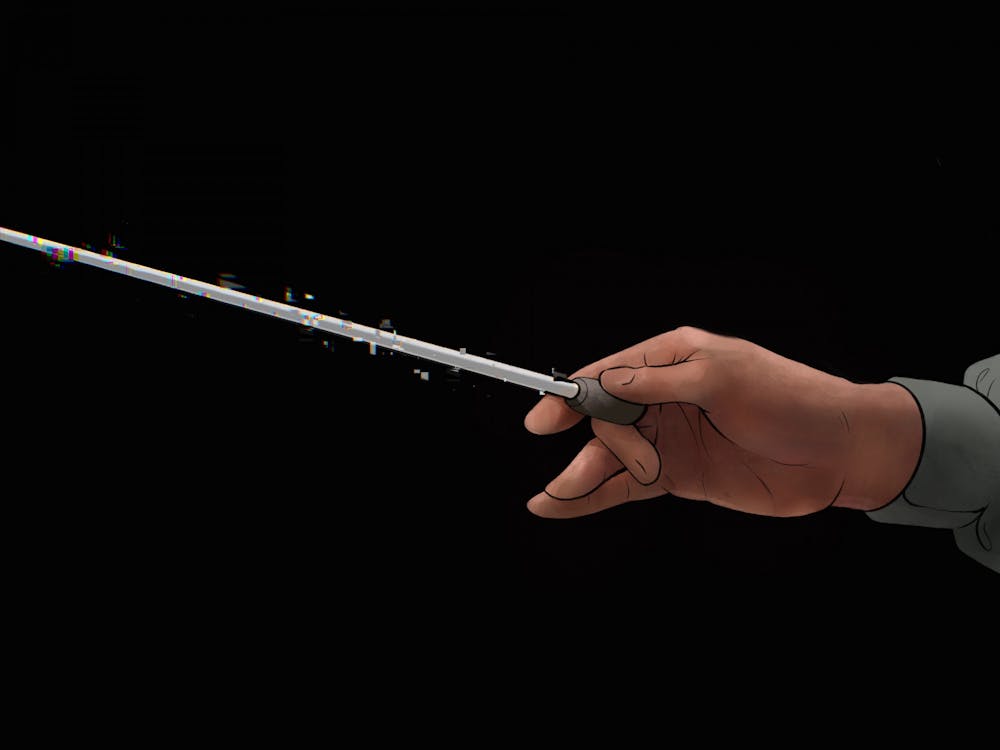We were “duped”—it was “trickery”—we had fallen right into “a trap.” Who, you might ask, was the agent of this malevolent manipulation? A dating app catfisher? The con artist at the top of a pyramid scheme? No. According to a number of critics (and audience members who took to Twitter) the trickster, here, was the writer-director, Todd Field, and marketing team of the 2022 feature film Tár.
Tár centers around Lydia (Cate Blanchett), the eponymous contemporary classical music superstar and conductor of the Berlin Philharmonic, in the days leading up to her live recording of Mahler’s fifth symphony. Lydia is a white lesbian woman in early middle age, married to the concertmisstress Sharon (Nina Hoss). She is a staunch skeptic of what she might call—for lack of a better term—“woke culture.” In one early scene, she argues that Bach’s misogyny and racism have no bearing on the value of his music, and disparages the Black conducting student who suggests otherwise. She also has a predilection for pursuing and (maybe) sleeping with younger members of her orchestra—the film is intentionally vague about the real extent of her wrongdoings. Tár tells the story of Lydia’s professional and psychological decline as her actions and their muddled consequences push their way into private and then public view.
This movie, like many—if not most—other movies shown in theaters these days, is fiction. Anyone who has seen Tár can attest to the thoroughness and deftness of the movie’s hyperrealism, but realism is not the same as reality—a distinction that audiences, in almost all cases, are willing to accept. What made audiences react so differently to Tár?
I came into Tár aware of the movie’s genre (drama, not biopic) and so was not in a position to feel “duped” as others had, but I wanted to figure out where this sense of betrayal and frustration might have come from.
I watched Tár at 7:30 on a Saturday evening, in the Coolidge Corner Theater in Boston. Like Providence’s own Avon Cinema, stepping into Coolidge Corner is like traveling back in time, to a pre-AMC era where movie theaters played double features and had elaborate painted woodwork on their ceilings. It’s an apt setting for the kind of world-transport that movie-watching provokes. Yet as soon as the previews were over and Tár began, I felt almost as if I’d been taken out of the theater and plopped right back down on the street outside.
The film begins with Lydia talking with Adam Gopnik (real person, played by himself) at the (totally real) New Yorker Festival. Gopnik introduces Lydia, making reference to her many accolades, including her title as an “EGOT” (real). Lydia talks about her admiration for Leonard Bernstein (real), Gustav Mahler (real), and Caroline Shaw (a more obscure name-drop to those audience members not at least semi-immersed in the classical music world, but totally real and an immaculately clever insertion; I, a formerly-serious flutist, knew who she was, and had a silly moment of self-satisfaction).
I started to understand why the audience might have assumed this was a biopic. Lydia is surrounded by pandemic references, Wikipedia pages, and ultra-specific fancy pen brands—she’s even surrounded by real people. Amidst all this precise reality, she is the only true contrivance. It’s disorienting.
Is this dissonance between fiction and reality enough to explain the outrage viewers have expressed with Tár? That is, we can be confused or surprised by the knowledge that Lydia isn’t real, even as she inhabits a world that the director makes no attempt to differentiate from our own—but why are so many viewers so put off?
There are two possible answers, I think. By setting Tár in a world that is indistinguishable from reality and then placing issues of sexual power, identity, and “cancel culture” at the film’s thematic center, the director inserts himself—quite explicitly and precisely—into these ongoing debates.
And maybe there is a point at which the critique becomes uncomfortable to witness. You might think that that point is most quickly reached through realism: How could we not feel indicted by watching our worst sins play out, straight, no sugarcoat, on the screen? Now, there’s plenty of realism in Tár, and it does serve the director’s purpose in highlighting some of the uglier sides of how power plays out in the classical music world and outside of it.
But I would argue that the movie’s small dose of fiction makes its social criticism even more powerful, because—hear me out—fictional characters can hold a symbolic weight that real-life people do not. While real people are molded by and positioned in culture, they are also products of narrow and specific circumstance. Fictional characters, on the other hand, are pure culture. Yes, they are often colored and marked by the limited experiences of their creator—but a writer, wonderfully, can reach outside the realm of his own life, constructing a new being by drawing from all that surrounds him. This process of construction also relies on the audience, whose varied and unfettered interpretations of a character make the character who she is just as much as a writer might.
In that sense, fictional characters could be any of us, while real people are, to some extent, only themselves—which makes it possible to distance ourselves from them. Had Lydia been real, we could have found something soothing in interpreting her as a specific and unsavory aberration. But with the conductor as a character, we are robbed of this recourse.
But maybe the problem is not that Lydia Tár’s fiction makes her a better vessel for reality. Maybe the problem is that while the rest of the movie feels hyper-real, Lydia is not just fictional, but totally contrived—that is, having no plausible parallel in reality. As one commentator writes: “How do we know that a queer woman chief conductor would act so egregiously? There haven’t really been any.” (Only one queer woman has ever led a major orchestra in the U.S. or Europe). Maybe, when viewers feel betrayed, they are responding to having been misled and misdirected towards dwelling on a “problem” that, while hypothetically possible, is not exactly salient in the real world.
This argument collapses as soon as you admit that Tár is certainly not just trying to comment on the phenomenon of female conductors’ sexual impropriety. Instead, the film situates itself inside conversations about sex and power more broadly. That issue: totally real. Do narratives of gay women abusing their power (also real) fit within this framework? Of course. Now, it’s entirely productive to consider male/female dynamics of sexual power as they relate to Lydia’s female/female story, but the two are not the same. Lydia, while powerful, does not possess or exercise power in the same quality, quantity, or flavor as would a man—but Tár makes little attempt to acknowledge this, self-consciously presenting Lydia’s experience as parallel to that of a male mentor.
I respect Fields’ intent in wanting to make a movie that allows for a nuanced exploration of sex, power, and how accusations of sexual abuse play out, for better or worse, on the public stage. That’s a worthy goal. But when we talk about sexual harassment, we tend to talk about men harassing women, and while that might not be the whole story, that focus is justified: It’s the more common case. So why did Fields decide to make his protagonist a lesbian—a category of people who are hardly at the center of our debates about sexual misconduct? His failure to meaningfully explore the differences between Lydia’s experience and her male mentor’s makes it possible to see the protagonist’s gender as something of a tool.
Consider this: There’s a new movie out. It’s called Tár. It centers around a renowned conductor—his name is Lyndon Tár. He’s married to the concertmistress, and he’s rewriting audition ratings to favor the hottest cellist. It seems like he may have slept with his old protegé, Krista. But wait! He’s complicated! Have some sympathy! Give him a break!
I would not go to see that movie. I think not very many people would. Because what makes Tár a really good movie is the fact that we do sympathize with Lydia, despite all she’s done—and I think that sympathy would not have been possible had the protagonist not been a woman. So, in the most cynical of terms, Lydia may be the ultimate contrivance: a character with no real-world analog, constructed only to capture our sympathies in order to make us think in a way that we otherwise would not. Here is the betrayal; here is the bait-and-switch.
But after all of that, I’m still not sure. Because when art makes you think in a way that you otherwise would not, is that really a betrayal? Is it manipulative—or is it powerful—in just the way that art should be?
I have no answer to that question, but please, go see Tár, and maybe you’ll manage to put a finger on it.
Lily Seltz is a former staff writer for post- magazine and new writer for the The Herald. She studies English (Nonfiction) with a certificate in Migration Studies. She is always searching for a better bagel.





